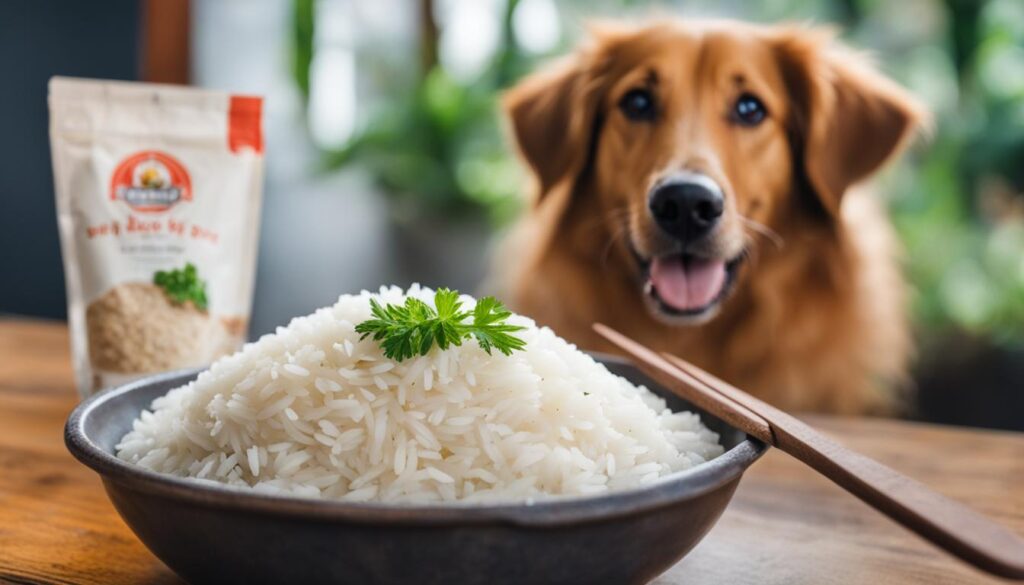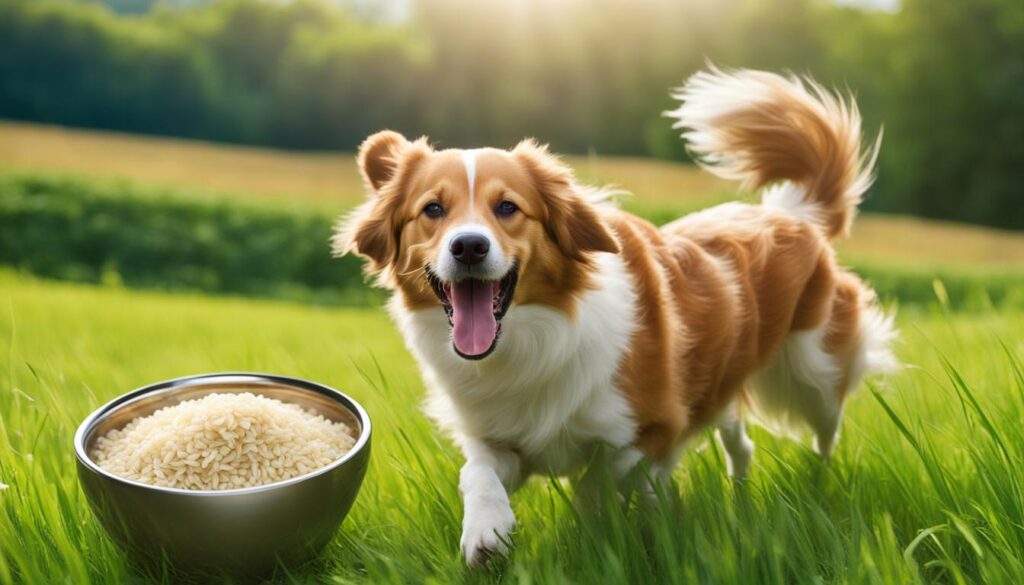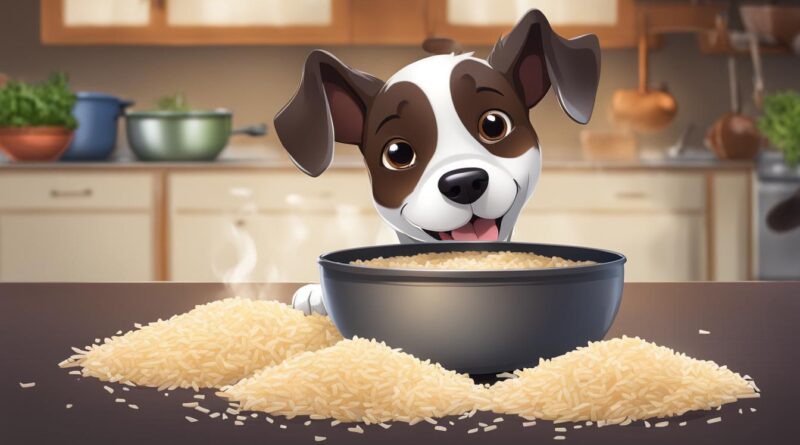Can Dogs Eat Basmati Rice? Safe Feeding Tips.
Dogs are not just pets; they are cherished members of our families. As pet owners, we want to ensure their health and well-being by providing them with proper nutrition. When it comes to their diet, it’s essential to consider safe and suitable food options for dogs. Basmati rice is a popular staple in many households, and as responsible pet owners, you might wonder: Can dogs eat basmati rice?
Basmati rice, like other types of rice, can be a part of a dog’s diet when fed in moderation. It provides dogs with carbohydrates and fiber, which are beneficial for their overall health. However, it is crucial to prepare and serve the rice properly to ensure the safety and nutritional balance of your furry friend.
When feeding basmati rice to dogs, it is important to cook the rice plain, without any seasonings, flavors, or additional ingredients that may be harmful to dogs. This means avoiding the use of salt, butter, or any other additives that are commonly added to human meals. Dogs have different nutritional needs than humans, and certain ingredients that are safe for us can be toxic or cause health issues in dogs.
Controlling portion sizes is also crucial when feeding basmati rice to dogs. While it can be a safe addition to their diet, it should not replace their primary dog food. Basmati rice should be given in small portions to ensure a balanced diet for your furry companion.
It is always recommended to consult with a veterinarian before making any dietary changes for your dog. They can provide personalized advice based on your dog’s age, breed, size, and any specific health concerns. Your veterinarian can guide you in determining the suitable amount of basmati rice to include in your dog’s diet and ensure that it aligns with their nutritional needs.
Key Takeaways:
- Basmati rice can be part of a dog’s diet when fed in moderation.
- It is important to cook basmati rice plain, without any seasonings or additional ingredients.
- Control portion sizes to ensure a balanced diet for your dog.
- Consult with a veterinarian before making any dietary changes for your dog.
- Always prioritize the overall nutritional needs of your dog.
Is Rice Good for Dogs?
Rice can be a valuable addition to a dog’s diet, providing essential nutrients to support their overall health. Brown rice, in particular, offers greater nutritional benefits compared to white rice.
Benefits of basmati rice for dogs:
- Rich in vitamins and fiber
- Provides energy for active dogs
- Promotes digestive health
While rice can be beneficial for dogs, it should only constitute a small portion of their overall diet. Dogs should primarily receive their essential nutrients from complete and balanced dog food specially formulated for their specific nutritional needs.
When incorporating rice into a dog’s diet, it is recommended to choose whole grain varieties such as brown rice. These types of rice retain the outer layer of the seed, which contains important nutrients that are lost during the processing of white rice.
Rice and Dog Nutrition
In terms of macro and micronutrients, rice contains carbohydrates that can provide dogs with readily available energy. Additionally, the fiber present in rice can aid in maintaining a healthy digestive system.
However, before making any dietary changes, it is essential to consult with a veterinarian. They can assess your dog’s specific nutritional requirements and advise on the appropriate amount and type of rice to include in their diet.
Always consult with a veterinarian to ensure your dog’s nutritional needs are met. They can provide guidance on the best diet for your specific furry friend.
Remember, a balanced diet is key to ensuring your dog’s overall well-being. Rice can be a beneficial addition, but it should never replace a complete and balanced dog food diet.
| Type of Rice | Nutritional Benefits |
|---|---|
| Brown Rice | Higher in vitamins and fiber compared to white rice. Retains the outer layer of the seed, containing essential nutrients. |
| White Rice | A bland option that can be easily digested. Caution should be taken with diabetic dogs due to its higher glycemic index. |
Can Dogs Eat White Rice?
White rice can be a safe and digestible option for dogs as part of their overall diet. It is often recommended for dogs with upset stomachs or digestive issues due to its bland nature. The simplicity of white rice allows for easier digestion and can provide temporary relief to dogs experiencing gastrointestinal discomfort. However, it’s important to note that white rice has a higher glycemic index compared to brown rice, meaning it can cause a more significant increase in blood sugar levels.
If your dog has diabetes or other health conditions that require careful monitoring of blood sugar levels, it is best to consult with a veterinarian before incorporating white rice into their diet. A vet can provide guidance on the appropriate portion sizes and advise on the most suitable diet for diabetic dogs.
While white rice can be a beneficial addition to a dog’s diet in certain situations, it should not be the sole component of their meals. Dogs require a balanced and nutrient-rich diet that includes a variety of proteins, fats, and carbohydrates. Always consult with a veterinarian to ensure your dog’s diet meets their specific nutritional needs.

Benefits of White Rice for Dogs:
- Easily digestible, making it suitable for dogs with sensitive stomachs
- Can provide temporary relief for dogs experiencing gastrointestinal discomfort
- A bland option for dogs on a restricted or specialized diet
Concerns When Feeding White Rice to Dogs:
- Higher glycemic index compared to brown rice
- Potential impact on blood sugar levels, particularly in dogs with diabetes
- Should not be the sole component of a dog’s diet
Remember, while white rice can be a part of a dog’s diet, it should be served in moderation and alongside other nutritious foods. Always consult with a veterinarian for guidance on feeding your dog the best rice options that suit their individual needs.
| Rice Type | Nutritional Content | Blandness | Impact on Blood Sugar |
|---|---|---|---|
| White Rice | Nutrient-poor compared to brown or basmati rice | Very bland, suitable for upset stomachs | Higher glycemic index, can affect blood sugar levels |
| Brown Rice | Higher in fiber, vitamins, and minerals compared to white rice | Relatively bland, but may be harder to digest | Lower glycemic index, less impact on blood sugar levels |
| Basmati Rice | Similar to white rice, limited nutritional value | Light and aromatic, appealing to dogs | Slightly lower glycemic index compared to white rice |
Can Dogs Eat Brown Rice?
Dogs can safely consume brown rice as part of their diet. Brown rice is a nutritious choice for dogs because it retains the outer layer of the seed, which contains essential nutrients. Compared to white rice, brown rice offers more benefits for dogs’ overall nutrition.
One of the main advantages of brown rice is its nutrient content. It contains higher levels of vitamins, minerals, and fiber compared to white rice. These nutrients contribute to a healthier diet for dogs, supporting their overall well-being.
However, it’s important to note that brown rice may be harder for dogs to digest, especially for those with gastrointestinal problems. In such cases, white rice is often recommended as a bland and easily digestible option.
To determine the best rice option for your dog, it’s crucial to consult with a veterinarian. They can assess your dog’s specific needs and health conditions to provide personalized feeding recommendations.
Overall, including brown rice in your dog’s diet can offer nutritional benefits. Just remember to introduce it gradually, monitor your dog’s response, and ensure it complements a balanced and varied diet.
In addition to brown rice, other types of rice such as basmati rice can also be included in a dog’s diet in moderation. While rice can be a suitable addition to their meals, it’s essential to prioritize their complete and balanced dog food to meet all their nutritional requirements.
Benefits of Basmati Rice for Dogs
Basmati rice, known for its aromatic fragrance and distinctive taste, can also provide benefits for dogs when incorporated into their diet. Basmati rice shares similar characteristics with other rice varieties, offering carbohydrates and fiber. Additionally, it is a gluten-free option, making it suitable for dogs with gluten sensitivities or allergies.
However, as with any new food, it’s crucial to introduce basmati rice gradually and monitor your dog’s response. If there are any concerns or pre-existing health conditions, consulting with a veterinarian is recommended to ensure your dog’s dietary needs are met appropriately.
Canine Diet and Rice
When considering rice as part of your dog’s diet, it’s important to recognize that it should only be a small portion of their overall meals. While rice can provide dogs with energy and digestive health benefits, it should not replace their complete and balanced dog food.
Consulting with a veterinarian is crucial to determine the appropriate amount and frequency of rice in your dog’s diet. They can provide tailored advice based on factors such as your dog’s size, age, activity level, and any existing health conditions.
Remember, a well-rounded canine diet consists of a variety of quality ingredients that fulfill their nutritional needs, including protein, fat, carbohydrates, vitamins, and minerals.

| Brown Rice | White Rice |
|---|---|
| Retains outer layer with essential nutrients | Refined, outer layer removed |
| Higher in vitamins and fiber | Lower in vitamins and fiber |
| More challenging to digest for some dogs | Easier to digest |
| Beneficial for dogs’ overall nutrition | May be suitable for dogs with upset stomachs |
| Consult with a veterinarian for specific dietary recommendations | Consult with a veterinarian for dogs with diabetes |
Conclusion
In conclusion, basmati rice can be a safe and nutritious addition to a dog’s diet when fed in moderation. Dogs can benefit from the carbohydrates and fiber provided by basmati rice, making it a suitable option for those looking to diversify their dog’s food choices. However, it is crucial to serve plain basmati rice without any additives or seasonings that may be harmful to dogs. Additionally, it is important to consult with a veterinarian before introducing any new food items to your dog’s diet, especially if they have specific dietary restrictions or health conditions.
When it comes to dog food options, it is essential to prioritize the overall nutritional needs of your dog. While basmati rice can offer certain benefits, it should not replace a complete and balanced dog food. Your dog’s diet should consist of a variety of high-quality dog food options that meet their specific nutritional requirements. Always consult with a veterinarian to ensure that you are providing the best diet for your furry friend.
Remember, while there are safe human foods for dogs, it is crucial to exercise caution and research before incorporating them into your dog’s diet. Each dog is unique, and their nutritional needs may vary. By being mindful of their specific requirements and seeking professional advice, you can ensure that your canine companion stays healthy and well-nourished.
FAQ
Can dogs eat basmati rice?
Dogs can eat basmati rice in moderation as part of a balanced diet. Basmati rice, like other types of rice, can provide dogs with carbohydrates and fiber.
Is rice good for dogs?
Rice can be a good addition to a dog’s diet as it is packed with essential nutrients. It can provide dogs with energy and can be beneficial for their digestive health.
Can dogs eat white rice?
Dogs can eat white rice as part of their diet. It is often recommended for dogs with upset stomachs as it is fairly bland and easily digested.
Can dogs eat brown rice?
Dogs can eat brown rice as part of their diet. Brown rice retains the outer layer of the seed, which contains many important nutrients, making it a more nutritious choice compared to white rice.


